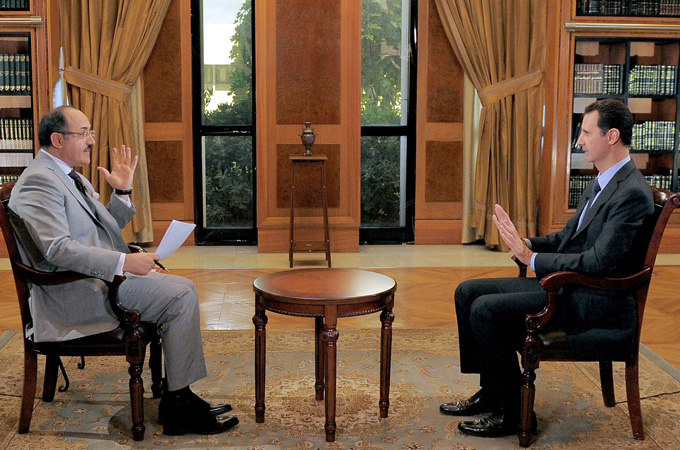LATEST: Saudi Arabia Confirms Distancing from US Over Syria Policy
SUMMARY: Speaking to the pro-regime Al-Mayadeen TV on Monday, President Assad set out the path to political victory that we noted last weekend.
See Syria Analysis: A Trip to Moscow Reveals Assad-Russia Strategy for Victory
First, portray the opposition as “foreign-supported mercenaries” and “terrorists”.
Second, exploit the US retreat from intervention to detach other key powers from the opposition and insurgency: “Saudi Arabia carries out the American policies faithfully….[It] will change its attitude towards Syria if the USA does.”
See Syria Analysis: How US is Splitting from Turkey and the Insurgents
Third, support the US-Russia plan for a “peace” conference, now proposed for November 23 in Geneva, while blaming any failure on the opposition:
No time has been set, and the factors are not yet in place if we want [the conference] to succeed.
Which forces are taking part? What relation do these forces have with the Syrian people? Do these forces represent the Syrian people, or do they represent the states that invented them?
Fourth, retain power whether or not the conference is held, running for “re-election” in 2014: “I don’t see any reason why I shouldn’t run in the next election.”
Will the strategy work? Assad did not talk about how his forces would defeat the insurgents on the battlefield. Ignoring the ongoing fighting — including Assad’s continued siege of insurgent-held towns in Homs and Damascus provinces, and his intensified air and artillery strikes against civilian positions in insurgent-held towns — has been an integral part of the Syrian Government’s strategy post August 21.
And, after weeks of American retreat, there was some push-back on Monday — at least in rhetoric — after Secretary of State John Kerry met Saudi and Qatari Foreign Ministers. Kerry said:
I don’t know anyone who believes the opposition will ever consent to Bashar al-Assad being part of government….This war will not end as long as…he is there.
Kerry is set to meet with other members of the Friends of Syria and the opposition in London on Tuesday.
Latest Updates, Most Recent First
Russian Deputy FM Discusses Geneva II Peace Talks With Syrian Ambassador
The Russian Foreign Ministry on Tuesday noted that Deputy Foreign Minister Mikhail Bogdanov met with Syria’s Ambassador to Moscow, Riad Haddad, to discuss preparations for the Geneva II peace conference, as well as bilateral relations between the two countries.
Syrian National Coalition President: Opposition Won’t Attend Geneva II Unless Assad Steps Down
The President of the Syrian National Coalition, Ahmad Jarba, is to tell the Friends of Syria in London on Tuesday that the opposition will not attend proposed peace talks in Geneva unless the aim of the conference is to have Bashar Al Assad step down.
The Daily Star reports that, according to a text of a speech Jarba will make to Arab and Western allies, the SNC President is to say that the Syrian opposition risks losing credibility if it gives in to pressure to attend the talks without achieving its goal of removing Assad from power.
UPDATE: Reuters has more details of Jarba’s expected speech.
According to Reuters, whose reporters have seen the text of Jarba’s speech, the SNC President will say, “The people will not believe us and will regard us as traitors to the revolution and to the blood of the rebels….The Sultan (Assad) must leave. Geneva cannot succeed and we cannot take part if it allows Assad to gain more time to spill the blood of our people while the world looks on.”
Saudi Arabia Confirms Distancing from US Over Syria Policy
Saudi Arabia’s head of intelligence, Prince Bandar bin Sultan, has confirmed to European diplomats that the kingdom will limit dealings with the US in protest at Washington’s retreat from support of the Syrian insurgency, as well as its rapprochement with Iran, a source close to Saudi policy said on Tuesday.
Prince Bandar bin Sultan told the envoys that the Obama Administration had failed to act effectively on the Syria crisis and the Israeli-Palestinian conflict, was growing closer to Tehran, and had not backed Saudi support for Bahrain when it suppressed mass protests in 2011, the source said.
Diplomats in Saudi Arabia said Bandar invited a Western diplomat to Jeddah over the weekend to criticize Washington.
Last week Riyadh turned down its seat on the United Nations Security Council amid reports of its unhappiness with the Americans.
“This was a message for the U.S., not the U.N.,” Prince Bandar was quoted by diplomats as saying.
Britain: We Are Backing Moderates Against “Extremist” Insurgents
British Foreign Secretary William Hague has declared, just before Tuesday’s meeting of the Friends of Syria group, “The reason we have to make sure we are supporting and dealing with the moderate opposition committed to a democratic, pluralistic, non-sectarian future for Syria is precisely because if they don’t have a role, then all the Syrian people have got left is a choice between Assad and extremists.”
He continued, “The longer this conflict goes on, the more sectarian it becomes. That’s why we’re making a renewed effort” with the Geneva II “peace” conference. Hague did not explain how the conference would empower moderates.

